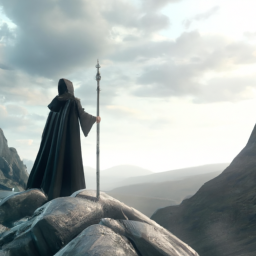Mages and their magical abilities have been a staple in fantasy fiction for centuries. From the wizarding world of Harry Potter to the enchanted lands of Middle-earth, mages have played pivotal roles in shaping the narrative and guiding the protagonist on their journey. But what is it about magic and the mage archetype that captivates us? In this article, we will explore the role of mages in fantasy fiction, the symbolism behind their powers, and their enduring popularity in pop culture.
The mage, also known as a wizard, sorcerer, or magician, is a character who possesses magical abilities beyond the realm of mortals. They are often depicted as wise, powerful, and mysterious figures who can manipulate the elements, cast spells, and harness the forces of nature. In many stories, the mage serves as a mentor or guide to the protagonist, providing them with the knowledge and tools they need to overcome obstacles and save the day.
One of the most iconic examples of the mage archetype is Gandalf the Grey from J.R.R. Tolkien's The Lord of the Rings. Gandalf is a wise and powerful wizard who serves as a mentor to Frodo Baggins and the rest of the Fellowship of the Ring. He uses his magical abilities to help them on their quest to destroy the One Ring and defeat the evil Sauron. Gandalf represents the archetype of the wise old man, a figure who possesses knowledge and wisdom beyond that of ordinary mortals.
Another iconic mage from fantasy fiction is Albus Dumbledore from J.K. Rowling's Harry Potter series. Dumbledore is the headmaster of Hogwarts School of Witchcraft and Wizardry and a powerful wizard in his own right. He serves as a mentor and guide to Harry Potter, teaching him valuable lessons about magic, life, and love. Dumbledore represents the archetype of the benevolent mentor, a figure who guides the hero on their journey and helps them to become the best version of themselves.
The symbolism behind the mage archetype is complex and multifaceted. On the one hand, mages represent the power of knowledge and wisdom. They possess a deep understanding of the world and the forces that shape it, and they use this knowledge to shape the course of events. On the other hand, mages also represent the danger of unchecked power. Their magical abilities can be used for good or evil, and if left unchecked, they can be a source of great destruction.
In pop culture, mages continue to be a popular archetype. From video games like World of Warcraft and Final Fantasy to TV shows like Game of Thrones and The Witcher, mages play a central role in shaping the narrative and providing the hero with the tools they need to succeed. They represent the power of imagination and the limitless potential of the human mind.
In conclusion, the mage archetype is a powerful and enduring symbol in fantasy fiction. Mages represent the power of knowledge, wisdom, and imagination, as well as the danger of unchecked power. They serve as mentors, guides, and companions to the hero on their journey, providing them with the tools they need to overcome obstacles and save the day. Whether you are a fan of Harry Potter or The Lord of the Rings, the mage archetype continues to captivate and inspire us with its magic and mystery.
